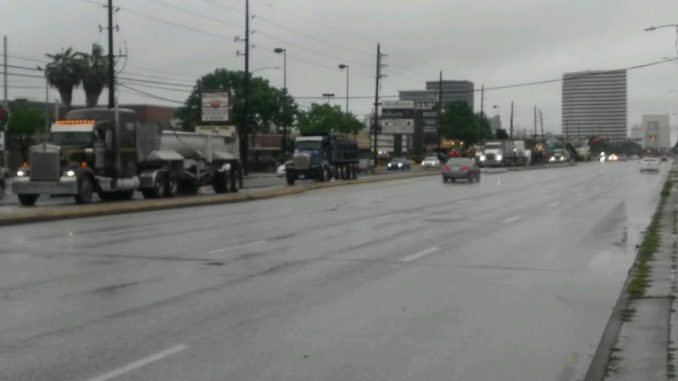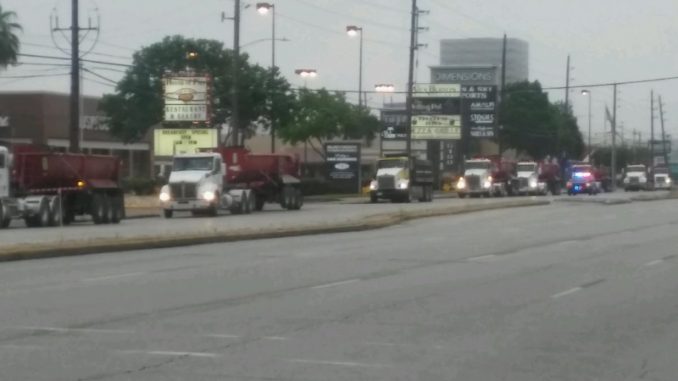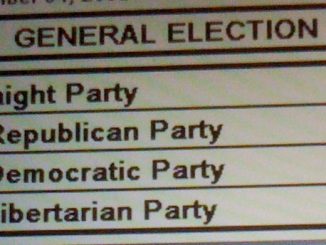
As I foreshadowed in my last post, we’re now into April, the make or break month of the 2020 COVID-19 pandemic. I got up around 7:00 am on Saturday morning, 4 April, and found myself a little hungry and not much in a mood to make myself breakfast. I decided to take a walk down to Westhemier, Houston’s greatest street, and take a look around before heading off to a nearby restaurant to pick up a drive through breakfast.
Westheimer was a mournful sight. I saw a great street, full of dreams and opportunity and a symbol of commercialism, that had been nearly silenced because of stay-at-home edicts ordered by political authorities. I also saw something else, something that I remember having seen 11 years ago.
And that thing was government stimulus.
Westheimer – the ever-shovel-ready street
As I approached Westheimer, I could see a dump truck stopped at the intersection. When I reached Westheimer proper, I saw a long, long line of dump trucks, along with earth excavators, and an array of police and sheriff department vehicles parked along the far distant lane of the street opposite to me. I knew what those dump trucks were filled with. They were with asphalt.

I went to go get breakfast and drove home. Later in the day, I went back out to Westheimer to confirm my beliefs, and found that the trucks had in fact been layering Westheimer with yet another thin new layer of asphalt.
Now, many of you gentle readers out there might be thinking, good! Thank God the government is doing something, especially when the same government has crushed the existing economy in the name of halting the spread of a virus. The problem here is precisely that I’ve personally witnessed Westheimer get paved over twice within a span of 11 years, and both occasions were during an economic crisis. And that, gentle readers, brings up a pile of questions that I think are worth visiting.
The first time I witnessed Westheimer being paved over was during the 2008 world-wide economic crisis. I was weeks away from being swept up in the Tea Party movement, but one of the questions that went through my mind was exactly the same one that I’m putting forth now. I objected to tax money, whether current or borrowed, being spent paving over Westheimer when it looked abundantly clear to me that the street was in perfectly good condition. “Not so!” shouted the government authorities and the Houston Chronicle at the time. “You see, you’re not an expert on whether a street needs to be repaved over, and hence shut up and accept the fact that we’ve decided the street needs a repaving!”
Well, that was then. If the same argument is made that “We have to repave Westheimer again!”, and we’re told to swallow it all over again, that opens up a rather uncomfortable question. Are we really supposed to believe that a paving over of Westheimer can only last for 11 years before it is necessary to pave the street all over again? If so, what does that say about the quality of work from the last repaving? Or maybe roads should be chalked up to being what they are – government play toys assets to be used as authorities see fit. And if borrowed money needs to be dumped to engage in some Keynesian stimulation of the economy, then so be it. After all, since governments everywhere have effectively deprived most people from earning an honest living, we’ve gotta keep some people working, right?
There’s another element to this other than simply paving over roads that don’t really need to be paved over, while other roads and streets that do need work get neglected. Namely, during the late 1960s/early 1970s, there was the original wave of environmentalism that swept through America and the Western world. In its wake, a number of broad acts were pushed through Congress, including the National Environmental Policy Act of 1970, aka the NEPA Act. Now, one of the stipulations of the NEPA Act was that before any federal monies could be spent on an infrastructure project, the project must go through an environmental review process before the project can get started. So far, so good, right? Well, if you think this through, this Act can get to be quite a hindrance if suddenly the economy goes south and the ruling political classes suddenly want to push a whole pile of stimulus money out the door – like right now!
Where does Westheimer come into all of this? Well, before going any further, it should be noted Westheimer is not a local thoroughfare under the political jurisdiction of the City of Houston, nor is it a federal road. Rather technically, most of Westheimer is a farm to market road (FM 1093 to be exact), and thus falls under the jurisdiction of the state of Texas via TX-DOT. As such, something tells me that somehow pouring a bunch of new asphalt on top of the existing asphalt on Westheimer manages to escape having to do any expensive and time-consuming environmental studies that would otherwise have to be required before any infrastructure work could commence. If my thoughts are correct, then it would follow that pouring a bunch of asphalt on top of all the existing asphalt on Westheimer, whether the street needs it or not, becomes a politically useful thing to do whenever a bunch of taxpayer money needs to be spent in a hurry. Politicians love to talk about shovel-ready jobs, and well, Westheimer is a permanently shovel-ready street, always at the ready to have money poured onto it.
But in all the flailing about being done about this pandemic – indeed President Trump now wants Congress to pass a 2 trillion dollar infrastructure bill – you have to ask yourself how much good is being done through all this activity? Or, would it be much more productive (and cheaper) to simply get people face masks and to get virus testing going on a continuous and grand scale in order to get people back to work and living a semi-normal life until a vaccine can be found?
Additional thought: Were all those construction workers I saw out there pouring asphalt practicing social distancing? Just checking. After all, a number of METRO workers have tested positive for the coronavirus, and I warned Houstonians that METRO should not be operating under pandemic conditions. The same thought goes to those men I saw out there on Westheimer.



